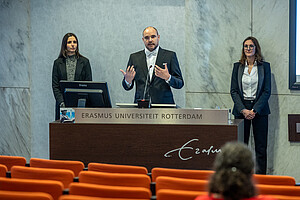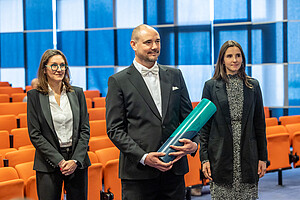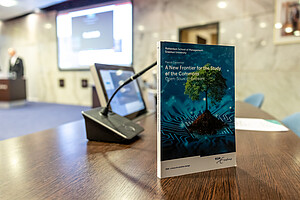PhD Defence Pascal Carpentier

In his dissertation, 'A New Frontier for the Study of the Commons: Open-Source Hardware', ERIM’s Pascal Carpentier explored, in three studies, the role commons play in helping Open-Source Hardware communities deliver and scale up end products. Commons have existed since antiquity and have structured the use, protection, and consumption of shared resources, usually subject to social dilemmas. Recently, commons have gained attention as governance models that inspire responses to the combined threat of COVID-19 and the environmental crisis. Pascal's dissertation offers fresh insight into the Open-Source Hardware movement, stating that it has more complexity than previously realized and requires a constantly evolving governance.
Pascal defended his dissertation in the Senate Hall at Erasmus University Rotterdam (EUR) on Thursday, 20 April 2023 at 15:30. His supervisors were Prof. dr. Lucas Meijs (RSM) and Prof. dr. ir. Vareska van de Vrande (RSM). Other members of the Doctoral Committee were Prof. dr. Tine de Moor (RSM), Prof. Charles M. Schweik (University of Massachusetts Amherts), Dr. Brenda Bushouse (University of Massachusetts Amherts), Dr. Frank Wijen (RSM), and Dr. Mélanie Dulong de Rosnay (Centre National de la Recherche Scientifique).
About Pascal Carpentier

Pascal Carpentier was born in 1977 in France. At Drugs for Neglected Diseases Initiative, a Geneva-based NGO, he is responsible for Information Systems management and evolution.
With over 20 years of experience in both the private and public sectors, Pascal had the opportunity to develop disruptive e-Health solutions for cardiac disease therapies at Medtronic. He also has extensive experience with NGOs; as Head of Solutions Delivery, he implemented an innovative finance mechanism for UNITAID. Previously, as Information System Manager, he kickstarted GAVI Alliance and the Vaccine Fund information system.
Pascal graduated with a Master’s degree in computer science specialized in Business Intelligence at Ecole Supérieure Informatique Electronique Automatique (ESIEA) in Paris and completed a Master in Business Administration at Business School Lausanne (BSL). PMP® certified (Project Management Professional) and an active PMI Switzerland Chapter (Project Management Institute) member, he volunteers to organize conferences promoting best practices in project management. He is also passionate about commons and open source communities and currently enrolled in a part-time Ph.D. at Erasmus University in the Business-Society Management Department. He hopes his research will improve the understanding of how alternatives and open ways of production can help disseminate knowledge and innovations to craft a fairer world.
Thesis Abstract

Commons have existed since antiquity. They have structured the use, protection, and consumption of shared resources, usually subject to social dilemmas. Recently, commons have been highlighted as inspirational governance models to help face the combined threat of COVID-19 and the environmental crisis. During the pandemic, for example, individuals spontaneously came together to help healthcare workers by building ventilators, masks, and medical spare parts. These communities exemplified a novel mode of production that favored collaboration, production, and learning for individuals over the need to maximize profit.
This dissertation consists of three studies that explore the role commons play in helping Open-Source Hardware communities deliver and scale up end products. The first study identifies industrial regulation as an overlooked threat to commons and proposes alternative strategies to achieving compliance with applicable regulations while protecting collective work. The second study challenges the idea that communities are homogeneous and that their members are equally motivated to participate in knowledge-sharing activities; we propose a new way of understanding commoners' motivations for participating in collective activities. The third study explores novel forms of commons that support innovative projects in complex environments: Innovation Commons.
Together, these studies offer fresh insight into the Open-Source Hardware movement. Although full of promise and more visible during the COVID-19 pandemic, this young movement struggles in regulated environments, has more complexity than previously realized and require a constantly evolving governance. In this dissertation, we explore this new frontier in the study of the commons.
View photos of Pascal's PhD Defence
Photos: Chris Gorzeman / Capital Images


